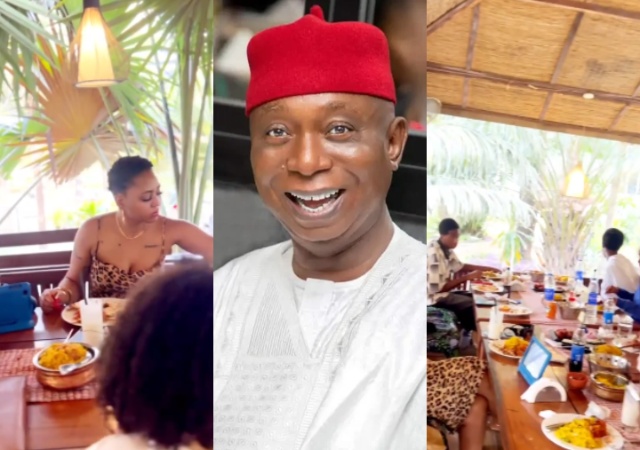Social media buzzed with mixed reactions as prominent Nigerian politician and philanthropist Ned Nwoko shared intimate moments from a family lunch that notably featured only his youngest wife, Regina Daniels, and their children. The exclusive gathering, documented through Nwoko’s social media post, has ignited conversations about family dynamics in polygamous households.
The senator’s heartfelt message captured the essence of the occasion, describing a day filled with storytelling, shared laughter, and culinary delights. The family’s post-lunch stroll, enjoying nature’s ambiance, painted a picture of domestic tranquility that resonated with many followers. However, the selective nature of the gathering promptly caught public attention.
Nwoko’s decision to share this private moment on social media offered a rare window into his family life, revealing a more personal side of the politician known for keeping his domestic affairs relatively private. His description of the experience emphasized the simple pleasures of family bonding, highlighting how shared meals can strengthen family connections.
The social media response to Nwoko’s post reflects the complex nature of public perception regarding modern polygamous families. While numerous followers applauded his dedication to creating meaningful moments with his family, others couldn’t help but notice and question the absence of his other wives from the gathering. This observation sparked broader discussions about the intricacies of managing relationships within polygamous households.
The contrasting reactions to Nwoko’s post illuminate the evolving perspectives on traditional family structures in contemporary Nigerian society. Some supporters defended his right to spend exclusive time with any portion of his family, while others expressed concern about the potential implications of such selective gatherings on family harmony.
Regina Daniels, a successful actress in her own right, has often been in the spotlight since her marriage to Nwoko. Their relationship has frequently drawn public attention, partly due to their age difference and her status as his youngest wife. This latest family gathering adds another chapter to their story, showcasing moments of domestic happiness while simultaneously raising questions about family dynamics.
The scenario presents an interesting study in how public figures navigate the complexities of modern family life under the watchful eye of social media. Nwoko’s choice to share this private moment publicly demonstrates either a conscious decision to be transparent about family dynamics or perhaps an unconscious revelation of preferred family arrangements.
Looking beyond the immediate reactions, this incident opens up broader conversations about the evolution of traditional family structures in contemporary African society. It raises questions about how polygamous families balance attention, time, and resources among different household members while maintaining harmony and ensuring everyone feels valued.
The online discourse surrounding this family lunch extends beyond mere curiosity about celebrity life. It touches on deeper societal questions about family values, relationship dynamics, and the challenges of maintaining equilibrium in complex family structures. The public’s varied responses reflect different generational and cultural perspectives on family arrangements and expectations.
What makes this incident particularly noteworthy is how it highlights the intersection of traditional practices with modern social media culture. The ability to share private family moments instantly with a global audience creates new dynamics in how polygamous relationships are perceived and discussed in public forums.
The ongoing discussion also reveals society’s evolving attitudes toward polygamy in the digital age. While legal and culturally accepted in many parts of Nigeria, the practice faces increasing scrutiny as social media platforms enable broader public discourse about family arrangements and relationship dynamics.
For Nwoko, this seemingly simple family lunch has become a catalyst for wider conversations about family life, personal choices, and public perception. Whether intentional or not, his social media post has contributed to important dialogues about modern family dynamics in traditional settings.
As the story continues to generate discussion, it serves as a reminder of how personal family moments can spark broader societal conversations. The various interpretations and reactions to this family gathering reflect the complex nature of maintaining and presenting family relationships in today’s interconnected world.
This incident, while centered on a private family moment, ultimately speaks to larger themes of family dynamics, public perception, and the evolving nature of traditional institutions in contemporary society. As social media continues to blur the lines between private and public life, such moments will likely continue to generate meaningful discussions about family structures and relationships in modern Africa.



